Introduction
In the ever-evolving landscape of specialty chemicals, gaining insights from leading experts is invaluable for understanding future trends and directions. In this exclusive interview, we delve into the minds of industry pioneers to explore the emerging opportunities, challenges, and innovations shaping the specialty chemicals sector.
Meet the Experts
Dr. Sarwh Johnson Senior Research Scientist, Specialty Chemicals Division
Dr. Johnson brings over two decades of experience in materials science and polymer chemistry to the table. Her expertise lies in developing advanced coatings and adhesives for automotive and aerospace applications.
Mr. David Shen Chief Technology Officer, Sustainable Solutions
With a background in chemical engineering and sustainability, Mr. Shen is at the forefront of green chemistry and renewable materials development. He is passionate about driving innovation while minimizing environmental impact.
Insights into Future Trends
1. Sustainability as a Driving Force
Dr. Johnson emphasizes the growing importance of sustainability in the specialty chemicals industry. “Customers are increasingly demanding eco-friendly solutions,” she explains. “From biodegradable polymers to renewable raw materials, sustainability is no longer a choice but a necessity.”
2. Digitalization and Industry 4.0
According to Mr. Shen, digitalization is transforming the way specialty chemicals are developed and manufactured. “With advancements in data analytics and automation, we’re seeing greater efficiency and agility in product development,” he notes. “Digital twins, predictive modeling, and smart manufacturing are revolutionizing the industry.”
3. Customization and Personalization
Both experts agree that customization and personalization are key trends shaping the future of specialty chemicals. “Customers want products tailored to their specific needs,” says Dr. Johnson. “Whether it’s colorants, additives, or coatings, customization allows us to meet diverse requirements and preferences.”
Overcoming Challenges and Embracing Opportunities
When asked about the challenges facing the specialty chemicals industry, Mr. Shen highlights regulatory compliance and resource scarcity. “Regulations are becoming stricter, requiring companies to invest in compliance management systems,” he observes. “Meanwhile, resource scarcity and supply chain disruptions are driving the need for alternative raw materials and circular economy solutions.”
Despite these challenges, both experts are optimistic about the future of specialty chemicals. “There are immense opportunities for innovation,” says Dr. Johnson. Whether it’s developing novel materials for emerging technologies or addressing global challenges such as climate change, the specialty chemicals industry is poised for growth and transformation.
FAQs: Answering Your Top Questions
1. What are specialty chemicals?
Specialty chemicals are high-value, low-volume chemical products that provide specific properties or functionalities to end products across various industries.
2. Why is sustainability important in the specialty chemicals industry?
Sustainability is crucial in the specialty chemicals industry to meet growing consumer demand for eco-friendly solutions and minimize environmental impact throughout the product lifecycle.
3. How is digitalization impacting the specialty chemicals sector?
Digitalization is revolutionizing the specialty chemicals sector by enabling greater efficiency, agility, and innovation in product development, manufacturing processes, and supply chain management.
4. What role does customization play in specialty chemicals?
Customization allows specialty chemical manufacturers to tailor products to meet specific customer needs and preferences, driving customer satisfaction and market differentiation.
5. What are the key challenges facing the specialty chemicals industry?
Key challenges facing the specialty chemicals industry include regulatory compliance, resource scarcity, supply chain disruptions, and the need for innovation to address global challenges such as climate change.





